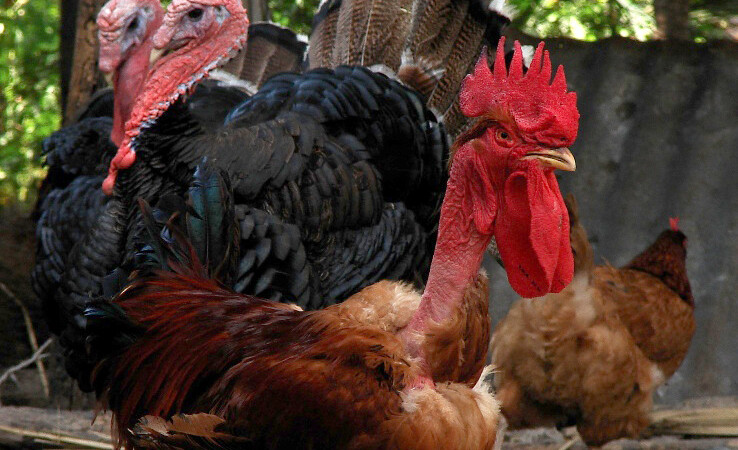

If you’re caring for chickens with limited space, you may be wondering how they get along with other species of animals. Because individual animals each have their own unique personalities, preferences, and histories of trauma, this resource may not apply universally to all chickens and the other species they interact with, but it should provide a good starting point in regards to how well a chicken will get along with other animals.
Chickens And Other Chickens
Typically a chicken will cohabitate just fine with other chickens. Chickens prefer to hang out in groups in most cases, and will immediately establish a pecking order to decide who rules the flock. Roosters can live together potentially even if they have fought once, if properly introduced and in an appropriate environment. If keeping roosters with hens, you must ensure that they are not attempting to mate too forcefully and have a plan in case you need to establish a separate flock. Mating-related injuries can kill hens.
Chickens And Ducks Or Geese
Although socially, chickens and ducks or geese can get along in common living spaces, there are a few things to consider when it comes to keeping them together. Ducklings or goslings and chicks require different food types- chick food sometimes includes medicine that ducklings can overdose on. Ducks and geese require a water source specifically to swim in separate from drinking water- chickens can drown in these sources. If ducks or geese and chickens get into a spat, it can be quite dangerous for the ducks as chickens have much sharper beaks, or dangerous for the chickens if a goose decided to get confrontational due to their large size, strong wings, and powerful bites. If you do decide to keep chickens and ducks or geese together, consider implementing a special area where the smaller birds can avoid larger ones if they desire.
Chickens And Turkeys
Female turkeys generally can cohabitate with chickens in free-range environments without issues (assuming they have adequate space), though it’s important to know that chickens can transmit blackhead to turkeys so it’s critical to keep their habitat clean. Blackhead tends to be much less communicable in turkeys older than 6 months, so wait that long to introduce a young turkey into a mixed flock if necessary.
Male turkeys generally should not live with female chickens, as they unfortunately have been known to accidentally kill chickens when attempting to mate with them. However, in some instances an older, more subdued large breed may be able to safely cohabitate with healthy female chickens so long as he shows no interest in mounting the chickens and the living arrangement is closely monitored on an ongoing basis. You should pay close attention to any changes in the Turkey’s behavior or if he appears more interested in the females. You should also pay close attention to the hens- looking for any signs of feather damage, changes in behavior such as hiding, or changes in mobility.
If you are caring for large breed turkeys and non-large breed chickens in the same living space, you must ensure that the turkeys cannot have access to the chickens’ free choice food, and the opposite is true if caring for heritage turkeys with large breed chickens.
If you have a lonely large breed male turkey and he isn’t too confrontational, you can house him with a rooster as a companion. Heritage male turkeys are more likely to cause dangerous injuries to roosters and should not typically cohabitate with any chickens due to their size and strength.
 Contact Jaguza Support
Contact Jaguza Support